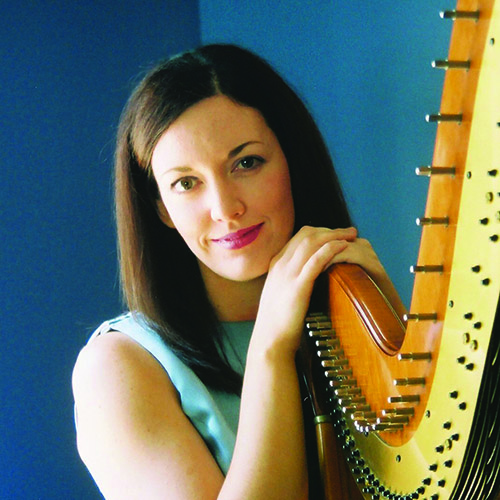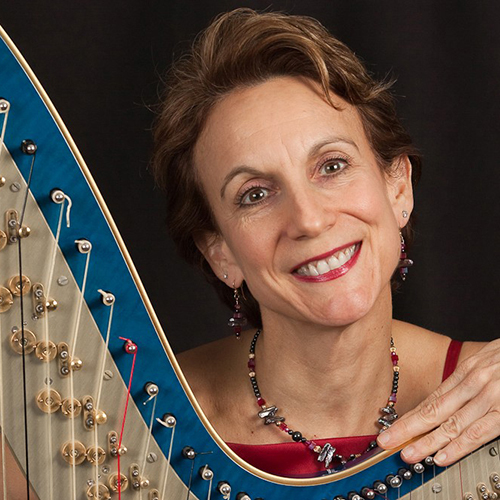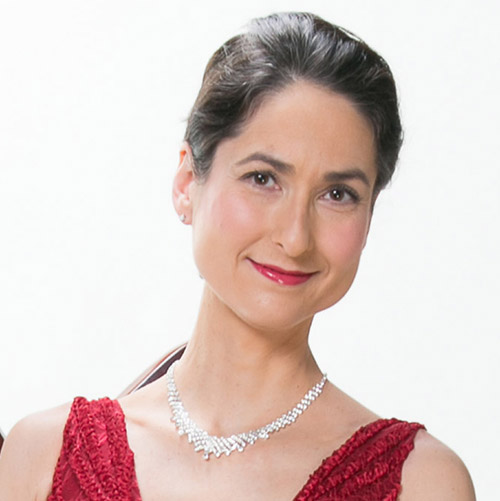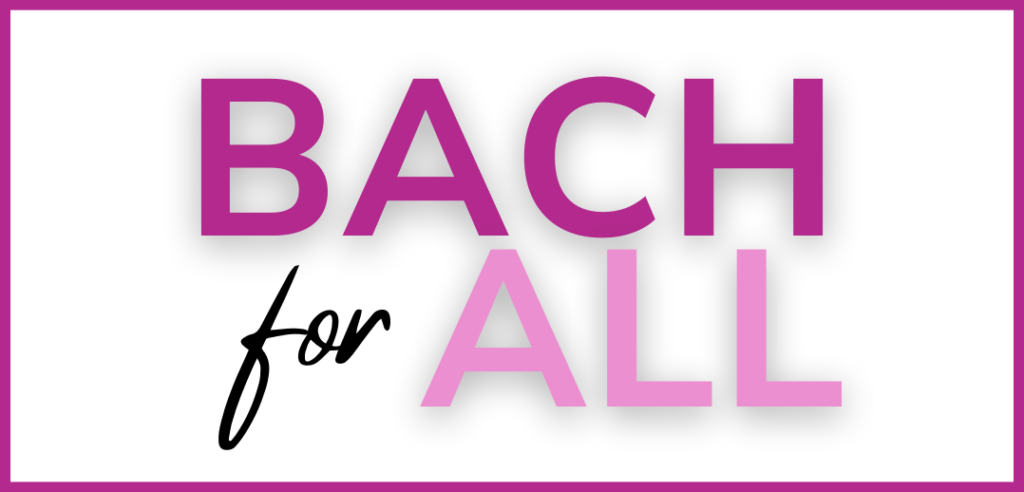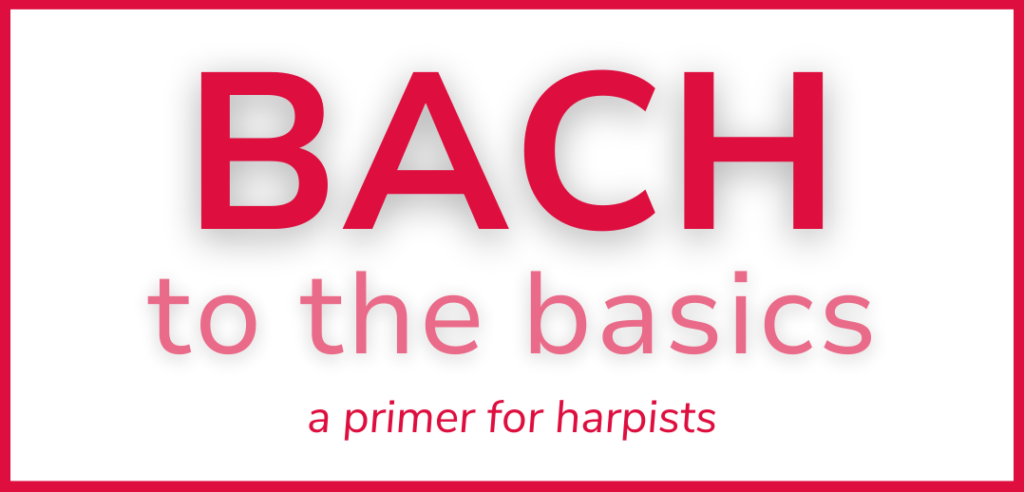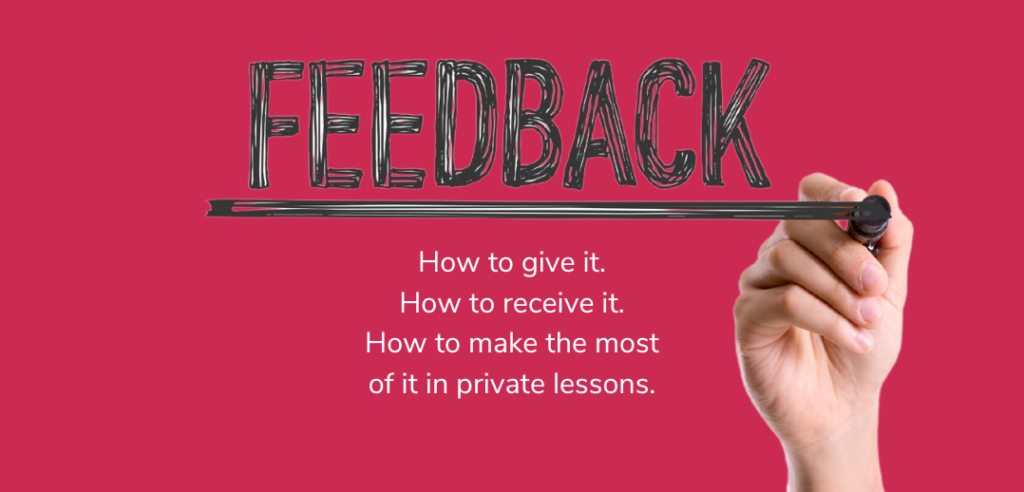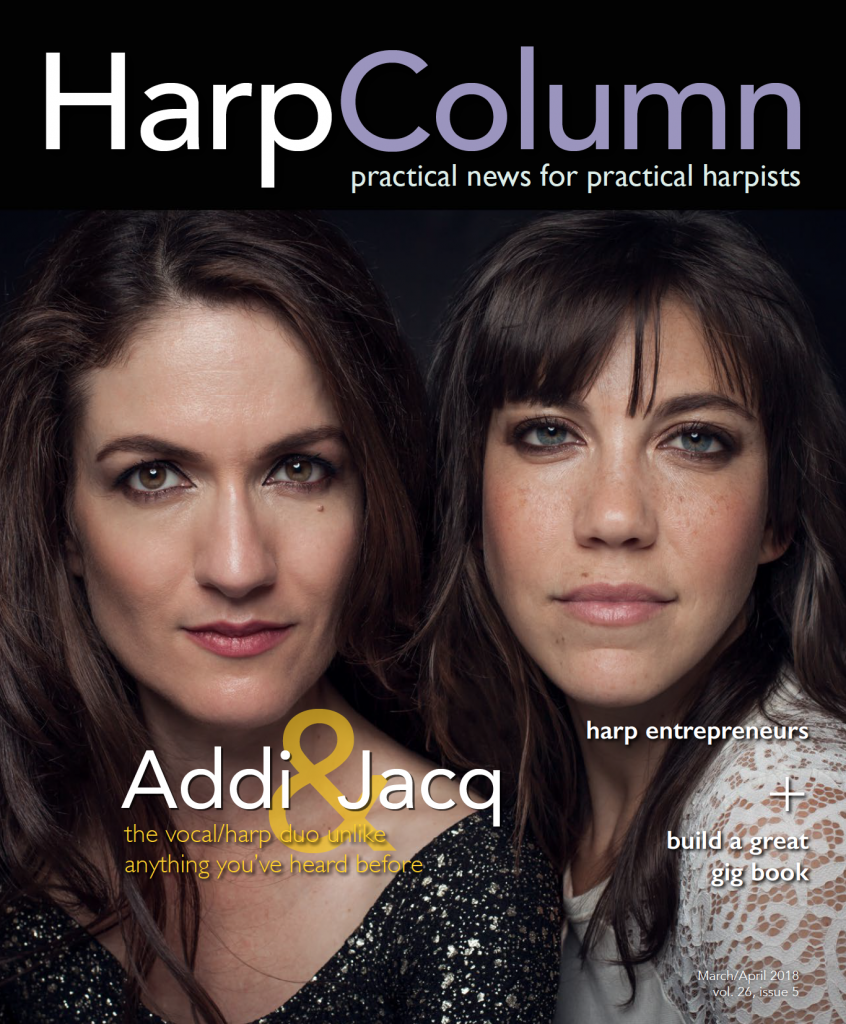Harpist-entrepreneurs share their thoughts about what it takes to build your own business. (from l. to r.) Michelle Abbott, president of Vanderbilt Music and Lyra Music; Sarah Javaux of the Javaux Music School; Pam Eldridge of Four Seasons Harp Covers; Felice Pomeranz of the Gilded Harps; and Devon Carpenter of the Music Factory.
The traditional story line many aspiring harpists ascribe to goes something like this: we learn the solo repertoire appropriate for recitals, the orchestral excerpts for our auditions, and concertos for the competition, then graduate with our degrees, ready to go get an orchestra job with union pay and benefits in line with the middle class dream.
We all know the traditional institution to which the harp has been attached—the symphony orchestra—has been shrinking, yet the traditional story line doesn’t include anything about marketing your skills or selling your art. To take on an entrepreneurial spirit is essentially to exit the state of denial many of us are in when we’re practicing our excerpts. That is, we have to accept that, while carrying on the tradition and profession of being a harpist, we have to eat, support that craft, and presumably have a good time doing so. Beyond the traditional revenue streams of performing and teaching, what’s a harpist to do? Get down to business.
“The spirit of entrepreneurship for us harpists is not simply to survive, or even to make money,” says Michelle Abbott, harpist and president of Vanderbilt Music and Lyra Music. “It is to eat out of our own hands, it is to help the art and to support one another. If we are serious about the integrity and survival of our instrument, we need to be in control of our art.” Abbott thinks harpists bring a range of expertise to the entrepreneurial table, and the growth of the harp world in the last 20 years has, in fact, expanded the types of opportunities available to harpists. “Whereas harpists were once beholden to contractors, publishers, distributors, and harp manufacturers who were not harpists themselves, the tables have started to turn.”
The harpist-entrepreneur is a growing story line in the North America. Not long after receiving her master’s degree from Temple University in Philadelphia, harpist Sarah Javaux moved back to Quincy, Ill., to start a music school. Javaux notes that the key to supporting yourself as a harpist or musician is very much the same as in any other entrepreneurial enterprise. You have to look around you to find what your community’s needs are, considering everything from commuter trends to population density.
“It took me a while to come around to the idea that a city like Quincy, with a population of 40,000, was large enough to support a music school,” she says. “Quincy is the largest town in the area, and as such attracts not only inhabitants of the town but people from smaller towns in the area. With that in mind, while the population is by no means huge, it’s large enough. Along with my brother and my mother, we provide violin, cello, harp, and piano lessons for a rather wide geographical area.”
But Javaux also points out that knowing your personal strengths is key. “When I was at Temple, teaching young kids at a school in New Jersey was a way of making money at first, but soon became one of my favorite things about being where I lived. However, Philadelphia is a large city with a large number of very well-trained and long-standing prep harp studios. To take what I do now in Quincy and do it in Philly would require a significant amount of time and money for publicity and marketing. I have no regrets about moving back to Quincy, but it’s because my gifts and the structure of my community here work very well together.”
While Javaux’s business enterprise was very intentional, finding your niche can sometimes be more of an accident, like in the case of Denver harpist Pam Eldridge.
“I was really tired of harp covers that just weren’t holding up, so I talked to a friend who made sailing gear and got a cover made,” Eldridge says. “People saw [the cover], and started to ask questions about it, and pretty soon we were in business.” Eldridge runs Four Seasons Harp Covers in addition to her work at the Colorado Ballet. “To be a successful entrepreneur you always have to be willing to try new things. If the opportunity arises to make a contribution, don’t say no.”
Harnessing the performing prowess of the harpists in Boston led to a very successful business venture for harpist Felice Pomeranz when she started the Gilded Harps over 30 years ago. “It’s a booking agency, with a roster of over 20 harpists in Boston,” she explains. “We provide harpists for concerts, weddings, corporate events, receptions, and lots of other types of events. We have harp trios, quartets, and also provide jazz and contemporary ensembles with other instruments.”
Indeed, the largest and most rewarding economy for harpists these days is that in which harpists interact with each other. The goods and services provided by a harpist-owned business present advantages others cannot. In the case of the Gilded Harps, Pomeranz says she is acutely aware of her harpists’ needs. “[Coming together as an agency] is a way of ensuring that we can get what we need, arranging the transportation and ensuring proper performance environments.” Whether it’s in our city or halfway around the world, building connections with other harpists is an increasingly important facet of a harpist’s entrepreneurial life. Through social media and professional organizations, harpists aren’t just seeking harpistic camaraderie, but they are helping others find obscure music they need, sharing markings, and exchanging professional advice. “While taking care of our own backyards is important, a neighborly mindset is super important,” Abbott says. “In my work, I spend a lot of time connecting the dots between harpists and those needing harp-related services. It’s what I’m passionate about.”
This is all great, but what about the work that gets done at the harp bench. That’s why we got that harp degree, isn’t it? To play? Again, from the standpoint of a newly-minted graduate, the idea that there is meaningful fulfilling work outside the orchestra pit or recital stage can feel foreign. How can such work really be fulfilling?
Harpist Devon Carpenter offers an interesting perspective on this question. While she does some teaching, her life is primarily spent playing corporate events and weddings. Though living in Illinois, her work is not confined to her backyard but takes her around the world to perform. “A few weeks ago, I flew to Panama with a flutist to play a wedding. I’ve had gigs in places as far away as Nigeria and India.”
Not long after graduating with a master’s degree in history from Valparaiso University, Carpenter spent two years working in India primarily playing Bollywood scores in studios. “It was difficult at first, as the harp isn’t immediately conducive to playing non-Western music. I spent so many hours listening to clips on YouTube while I was in India, that there were days I thought I would go crazy.”
Much of Carpenter’s success as a performing harpist has come from her ability to incorporate non-Western musical idioms into her playing, offering the harp as a potential tool where the instrument may not traditionally be considered. “My education in music theory in college was super important in learning to transcribe music that’s often transmitted aurally, and in modes or scales that aren’t idiomatic to the instrument,” she explains. “Since returning to the States, I’ve started incorporating a lot of Lebanese music into my repertoire and becoming familiar with a range of other styles.” Carpenter’s skill set might seem niche, but when you consider how much non-Western music there is yet to be explored at the harp bench, she may in fact be breaking into an emerging market. But most importantly, she loves what she does. So what’s her secret to a fulfilling harp business? “Never be afraid of a challenge,” she says. “Don’t be afraid to try something new. My own best personal growth has come from doing things I wouldn’t have thought of doing before.”
When you consider the commitment of these harp entrepreneurs to their businesses, it begs the question of balance.
Assuming we find a musical niche or specialty, how do we make sure that it doesn’t take over our life? How do we build a business while keeping our chops up? For Pomeranz, independent gigging is a key to artistic freedom. “If you do just orchestral work, you have a lot of rehearsals and hours on the job, and when you come home with the check, you think ‘really?’ A few corporate gigs can earn more money for less time, allowing you to support your practicing.” I admit this really resonated with me. At the end of the day, the goal shouldn’t be just to collect a check but also to keep up your chops. “There’s a lot of time spent in rehearsals that can’t be spent practicing,” Pomeranz says. “Many orchestral musicians don’t have the time to really practice. I can’t stand people that don’t practice.” Ouch, I’m thinking. Pomeranz continues, “Your profession should always help you to keep carving out your niche so you can profit from it musically, not just financially. You should wake up wanting more than anything to do you what you do for a living.”
These harp entrepreneurs might love what they do for a living, but they don’t walk around with their heads in the clouds. “You have to be realistic about your workload,” Pomeranz says, “to make sure that your work is adequately supporting your practicing and visa versa. It takes incredible structural discipline. It also takes a great deal of versatility and flexibility, and willingness to move in lots of different directions.” Eldridge’s time is a juggling act as well. “The ballet theater and my seamstress are located in totally opposite directions, both an hour from my house,” she says. “Depending on the day, I have to drive an hour in each direction. When I pick up the covers from my seamstress, then I get to see about distributing them and collecting payments. I also have private students, I have my work freelancing, and I also have to practice.”
A typical week for Abbott could include everything from talking with loaders and dock workers to meeting with business and music attorneys to working on web security for a new web store. Oh, and practicing too, of course.
So you’ve found your fulfilling and lucrative career and have a realistic sense of time management. That leaves the not-so-fun side of being your own boss: money and marketing. While this is the antithesis of what most harpists want to do at work, it’s a necessary part of the job. Sure, TurboTax can help you sort out different facets of your business come tax time, but there is so much more than just taxes to sort out.
“Get out of the practice room mindset and into a business mindset,” Abbott advises. “For young harpists out there: Know your exemptions. Know your state laws. Know your rights and regulations on the job at a union gig. Don’t leave it to someone else.” She continues, “There’s no doubt that the harp has the reputation of being a rich, pretty girl’s instrument. But you can’t rely on the instrument’s caché, you can’t rely on mom and dad, and you certainly can’t rely on a contractor or even a union rep. Never leave yourself in a position to be taken for a ride.”
I have three master’s degrees, two of which are in music, and not once in my education have I ever been spoken to about marketing, tax codes, or union membership. Is there something missing in harpists’ educations? “Universities and conservatories are businesses too,” Abbott says. “They provide an education that serves their purpose, which is the preservation and continuation of the physical art of sitting down at the bench and playing the harp. It’s not really their job to make sure we’re all fully employable in exactly what we want to do. Colleges aren’t job centers.”
Eldridge was a tad more circumspect.“Versatility is so important these days, that I often encourage my high school students to get other degrees besides music,” she says. “If you’re not prepared to play lots of different types of music or work lots of different directions in your career, then you ought to be prepared to support yourself with something besides music.”
Pomeranz was painfully realistic. “The standard conservatory model doesn’t cut it, which is one of the reasons I love teaching at [the Berklee College of Music] here in Boston. The whole point of Berklee wasn’t just to be a jazz school, but a contemporary trade school. We are very proud here to provide people with realistic job prospects. I teach a lot of jazz and contemporary harpists, but I also personally train people to go into music therapy. My students also get to work with other students, for instance training to work in recording studios with the latest equipment. It’s an environment where they really prepare.”
Javaux and Carpenter both agree, though, that music degrees are vital to their careers. Javaux’s experience and academic training in college gave her the skills to teach young kids. “My two harp degrees make me a better teacher. They have enabled me to pass on a solid music theory foundation to my students,” she says. “If I had not had theory in my degree, I wouldn’t be able to make a living.” Carpenter says nearly the same thing. “Without intense training in theory and aural skills, I wouldn’t be able to do what I do.” While happy with their degrees, they also both said they wished they had a business or accounting course in their educations. What is absolutely the most important financial tool? Javaux insists it’s basic computer literacy. “It’s so important to marketing yourself these days. The size of your teaching studio can grow or shrink unpredictably, and freelance work is unstable as we all know. Most of us can’t afford thousands of dollars to spend on web designers. At the very least, knowing your way around a simple service like WordPress is essential.”
In speaking to all these diverse entrepreneurs, the takeaway is that we should just get out there and do it—create that business opportunity. “Sure, we always need more business education and entrepreneurship classes, but all of the information [you need] is readily available,” Abbott points out. “Look at the number of people in the United States who run their own businesses without business degrees. Why should harpists be any different? It just takes work, the same as practicing—knowing how to handle your business’s finances is like the practicing you do to keep up your chops. Sometimes, it’s really not fun at all, but what it allows you to do is worth every minute of time invested.” •







